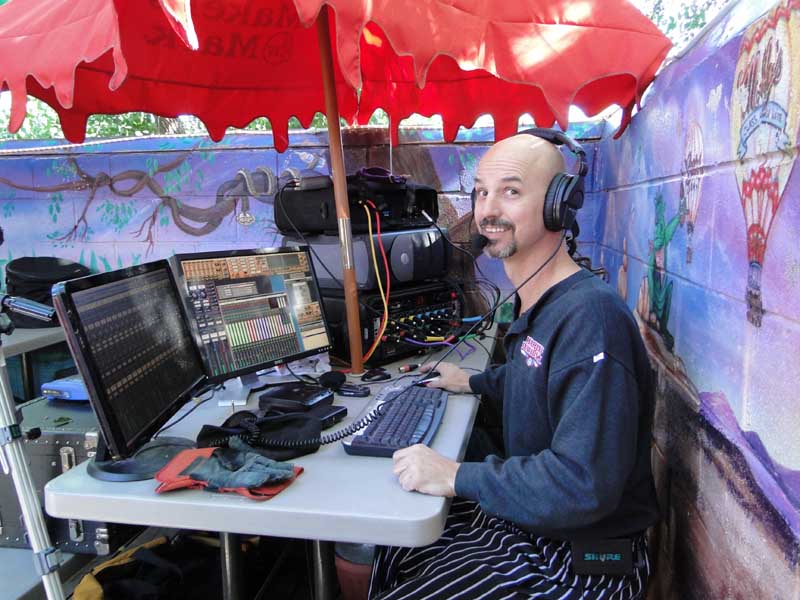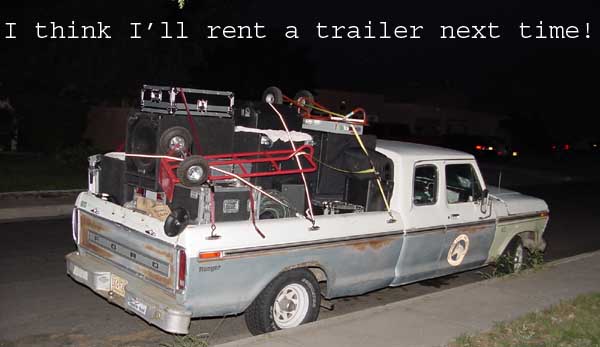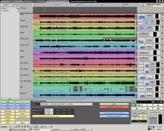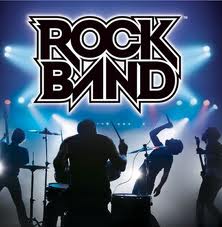|
How I deliver sound value. Why I'm different.
Back to "Index"

Here I am having the time of my life mixing on my new Software Audio Console at an outdoor show
What can I provide?
More easily answered would be, "What can I NOT provide?" September of 2010 was a benchmark month for my sound company. This was the month that I entered the digital era - the digital domain. What this means to you is that, sonically, I can literally provide ANYTHING you could ever want or need to make your performance the best experience you've ever had. As of this writing I can provide 40 input channels of totally digital audio. In addition I can provide 40 output channels - completely digital. If you want a 7.1 surround sound system at your show, I can provide that. If your drummer wants to hear acoustic guitar with a 300ms slap back delay, I can provide that, too. If your band requires 10, stereo in-ear monitor mixes, I can provide that. I can either do this from Front of House or provide a monitor engineer to manage monitor mixes from the stage. My friends, the sky is the limit.
Simply stated, I care about the way your band sounds:
I care about the solos; I care about the harmonies; I care about the volume, and I care about the mix. You won't catch me at the bar getting a drink during a performance. I'm focused on my work. I don't even like being talked to while I'm mixing. My full concentration is on the band, the music, and how it's all
supposed
to sound. I work hard to make sure the band sounds better than they ever have before.
One HUGE advantage I have over your present engineer:
I have been a
professional musician since 1981
and still continue to perform. I have a unique perspective as to what bands want, need, like, dislike, etc., because I've been there and continue to be there. Over the years I've grown a real distaste for sound engineers that ruin a band's sound. I can't tell you how many times I've winced at feedback issues, distorted vocals, static guitar mixes (that don't change in volume), under mixed or horribly mixed drum kits, distorted vocals, unheard vocal harmonies, unintelligible lead vocals because the mix lacks clarity, missed solos, harsh, mid-rangey mixes, LOUD mixes, too much effect, not enough effect, the wrong effect and on and on. We've all been there. Bands work hard to work out harmonies and solos. Shouldn't your sound engineer work just as hard to make sure it's all heard? It's a crime when all that hard work is dumped down the toilet because a sound engineer doesn't know how the song is
supposed
to sound. As a professional musician, I understand exactly how a song is supposed to sound. I predict solos and harmonies instead of reacting to them (sans original music I've never heard before). I can have a band sounding better by the 3rd song than their regular engineer has the entire time he's been with them. Don't trust your band's sound to a weekend karaoke DJ or your wife. Trust a professional that knows what a band should sound like and knows what knobs to turn to get it there.
Another advantage I have over your present engineer:
I have been a
licensed electrician since 1996.
What this means to you, your band and your instruments, is that I will make every effort to insure that clean, reliable power will be delivered to the stage. In addition, power outages often associated with live shows done in non-performance-oriented spaces will suffer a minimal amount of power issues. I have mixed 10-piece bands in Art Galleries with no power issues. This is not due to luck or by accident. I take time to scout a room days or even weeks ahead of a gig to insure power requirements will be met. I talk to house engineers, electricians and technicians to insure that your equipment AND mine are afforded the proper power needed to facilitate a flawless show. In situations where my power requirements are NOT met, I will tell you and your band mates ahead of time to expect possible power issues. Do to the quality of my power conditioning and power regulating equipment, I can insure stage instruments will not be effected by power issues that will more-than-likely effect the P.A. system or other house devices and peripherals.
Why I started mixing:
Sick and tired of dealing with crappy sound engineers, I finally decided to do something about it by making myself available to the Albuquerque music scene as a
uniquely qualified
sound engineer. My goal is to make every band I mix attain their best acoustic potential. I have several pet peeves that most musicians don't think about when hiring a sound engineer. My pet peeves are YOUR pet peeves. You just don't know you have them yet.
Feedback:
Boy oh boy do I hate feedback! I hate it so much that I've made it my personal mission to squash it like a bug! With the new digital tools at my disposal, keeping feedback at bay is easier than ever. I won't say I'm perfect (yet), but I'm much better at taking care of feedback issues than most sound engineers because I hate feedback so much!! If you suffer from feedback 3 or 4 times a night, it's time to change to a sound company that cares about things like that!! If you can't step off the stage with a microphone in fear of getting your ear ripped off by a 130 dB squeal, then please give me a call. I can help. There's no excuse for looming feedback during a performance. I don't tolerate it and you shouldn't either!
Communication:
I pride myself on my communication skills. I have a headset microphone that I don at all times during a show. This insures I can communicate with you at any time during a performance or between songs without screaming across the room. In addition I have my system set up so I can hear you via headphones back at the sound board. Simply speak in a normal tone into your microphone, and as long as I'm wearing my headphones, I can hear you. Normally hand signals will do, however every once in a while there's a need to communicate verbally. In those cases it comes in real handy to be able to have a private conversation between the two of us, even during a performance! No need to scream. Just speak normally. Gone are the days of screaming across the room or talking to your sound engineer over the P.A. system. The audience isn't there to hear you say, "I need more monitor!" They're there to be entertained.
Getting the sound guy's attention:
Another pet peeve is not being able to get my sound engineer's attention. Some sound guys have their eyes glued to the board or even worse, are at the bar getting a drink! Yikes! During any given performance my eyes move from the board to the band. I make sure that getting my attention isn't an impossible task. One way or another, I will hear or see you and I will address your concerns. Which leads me to my next topic...
Monitor mixes:
Traditionally, monitor mixes have been tough. In the past I've done a pretty good job with monitors. But now, with new digital tools at my disposal, getting a perfect monitor mix is easier than it has ever been. Every performer is different and most don't know the technical jargon necessary to guide a sound engineer to a good monitor mix. However I now have wireless remote capabilities. What this means to the performer is that I can stand next to you while we discuss and customize your monitor mix to your taste. Once the performance has started, I keep a watchful eye on the stage. I can usually discern what a performer is trying to communicate and react accordingly. Rest assured, your monitor mix is just as important to me as the Front of House mix. You can bet I will go the extra mile to insure your monitors sound good.
Unheard solos and vocals:
Man-o-man I can't stand it when you can't hear a solo! Whether the solo be guitar, bass, keyboard or even vocal, you can betcherass you'll be heard if I'm turning the knobs. I've been a professional musician for over 27 years. I know where solos are supposed to be. I know where backup vocals are supposed to be. Nothing chaps my ass more than WATCHING a band do 3-part harmonies and NOT hearing them. There is a lot of technology in place to insure that a sound engineer can mix a perfect blend of vocal harmonies. Most local sound engineers either lack the saavy (because they're actually karaoke DJ's) or wherewithall to make sure harmonies blend. You can bet that I'll be Donnie-on-the-spot with vocal harmonies, lead vocals and solos.
Unheard banter with the audience:
Nothing bugs me more than not being able to hear an artist's witty banter between songs. Part of any good performance and a band's charm is the witty banter and interaction they have with the
audience. When this witty banter isn't heard, it's because the sound engineer is too lazy or oblivious to care enough to raise the vocal level in the P.A. You'll never have to worry about
that with me.
Too much volume:
Admittedly I like a "strong" or "big" mix, which does require some sound pressure. However because I know what frequencies annoy people, I know how to acquire these "large" mixes without making people feel like they're listening to a "loud" band. There's a difference between perceived volume and "actual" volume - the latter of which can be read by a dB meter. There's a way to make music "felt" without blowing people out of the room. I know how to achieve that mix. To date I've had only one volume complaint from a club manager who saw my point when I completely turned down the volume on the board. He was hearing stage volume and vocal monitors, which he thought were too loud. This situation was obviously out of my control.
Guitarists read this! 
I always make sure guitar solos are heard. Guitar mixes are tough because many guitar players use too much distortion and/or play to loudly. If you're willing to work with me, I can assure you that every lick will be heard. I've made it my personal mission to achieve that perfect guitar mix. Every website and newsgroup in the world says that guitar issues have to be fixed at the guitar amp. I disagree. There is a way to make even the WORST sounding guitar palatable.
Final thought
Back to "Index"
I have spent a lifetime emulating great drummers and their drum tracks. That paradigm carries over to my sound duties. I consider myself as much a part of the band as any musician. I
care what comes out of those speakers more than anything else in the world during that moment. It's this kind of attention to detail that guarantees that you will get the best mix
possible.
Boring technical crap
Back to "Index"
Any seasoned sound engineer can tell you that the key to a good mix is what's called "transparency." Ideally, when analyzed with a spectrum analyzer, the "sound" of the room should be
flat. This means that the combination of "flat" P.A. components in concert with a "flat" room should produce a "flat" result, and shouldn't "color" the sound of the band in any way, shape or
form. Ideally, with no frequency modification, the P.A. in said room would have a flat, "uncolored" frequency response. It wouldn't be heavy or light in any frequency band throughout the
frequency spectrum. However, since that is a pipe dream, we have graphic equalizers that can sort of "flatten" a room. Professional sound engineers understand that concept.
In a club environment, most guys you see turning knobs at the sound board started off as a DJ or Karaoke business. These monkeys have no clue what "transparent" sound is. My P.A. is
pretty darn "flat" because I have allowed reputable companies like JBL, QSC and Mackie do all the work. These companies spend TONS of money in R&D to make sure the components they manufacture
produce "transparent" (flat) frequency responses. Reputable companies like JBL, Sound Bridge, Eastern Acoustic Works, Apogee, QSC, Mackie and ElectoVoice make "frequency response" data
available to all who are interested. These graphs usually demonstrate frequency curves of the given component. Other "mom-n-pop" operations, like Madison (of Loveland, Colorado) don't
make this data available. They guess and hope they get it right. Unfortunately, it's tough to "guess" a well-engineered speaker cabinet. Unfortunately I had to actually purchase this
second-rate gear before I figured out it sounded like crap. A good speaker design requires more than good carpentry skills. It requires acoustic engineers with degrees in acoustic
science.
Here's a good example of a good speakers' flat E.Q. response. This spec. sheet is for cabinets I presently own:
http://jblpro.com/products/portablesound/mrx/MRX512.pdf
You will notice how frequencies below 100 hz just drop off the scale. This is perfect because this is the natural crossover point for sub-woofers anyway (i.e. The subs handle everything under
100 hz).
So anyway...I didn't mean to bore you with a rant and a bunch of technical jargon. I'm actually okay with using other people's gear as long as it works. All I can guarantee with other people's
stuff is that I will run it to the best of its potential. With my equipment, I absolutely guarantee spectacular results. You have my word that people will tell you that your band sounds the best
you have ever sounded. I'm almost tempted to offer a "no happy, no pay" guarantee. I'm THAT confident.
This page is up as of August 1, 2007 - 4:PM and was updated July 12th, 2010 - 2:50 PM (added "Live video" link).
If you have any questions, comments or suggestions, or need a sound engineer that can unlock the full potential of your band, please...

...e'mail me
Or leave a message for Donnie on my land-line: 505-271-6880
Or you can contact me via my cell phone: 505-999-8561


All pictures & material Copyright © 2007 Donnie Frank
Company logo designed and created by Brandon McCutcheon
|

![]() is now 100% digital!
is now 100% digital!














